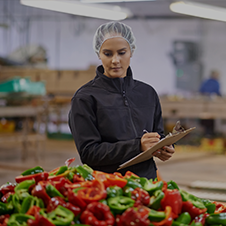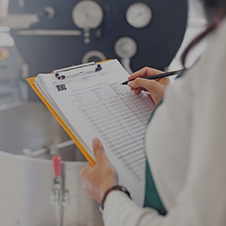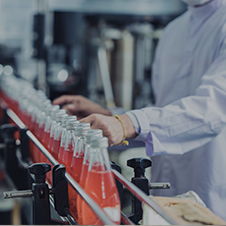Últimos Bebida alimenticia artículos sobre cumplimiento normativo
Descubra cómo la combinación de la capacitación de expertos FSVP y la cobertura confiable de agentes de EE. UU. protege su cadena de suministro de detenciones, rechazos y aplicación de la FDA.
Read More
Una inspección FSVP de la FDA es una auditoría de sus registros, no su intención. Domine la documentación necesaria para el análisis de riesgos, la aprobación del proveedor y las actividades de verificación con estas plantillas y ejemplos compatibles con 2026.
Read More
La detención de la FDA se produce rápidamente y puede dar lugar a rechazos finales de importación. Conozca los principales fallos de FSVP, desde análisis de peligros faltantes hasta proveedores no verificados, que desencadenan costosas retenciones de envíos y cómo prevenirlos antes de que lleguen a la frontera.
Read More
Domine los requisitos de FSVP de la FDA con nuestra lista de verificación definitiva. Aprenda a realizar análisis de riesgos, evaluar proveedores extranjeros y mantener los registros de verificación precisos necesarios para aprobar una inspección de la FDA en 2026.
Read More
Detenga la confusión entre el importador de FSVP, el importador de registro y el agente de EE. UU. Conozca las definiciones específicas de la FDA que determinan la responsabilidad legal de la verificación de proveedores extranjeros y evitan costosos errores de auditoría.
Read More

Bebida alimenticiaPreguntas frecuentes sobre las regulaciones de
¿Quién debe registrarse en la FDA?
Cualquier instalación nacional o extranjera que tenga la intención de producir y distribuir los siguientes productos para el mercado de los EE. UU. debe registrarse ante la FDA:
- Alimentos, bebidas o suplementos alimenticios
- Cosméticos
- Productos animales y veterinarios
- Dispositivos médicos
- Medicamentos (incluidos los de venta libre)
- Productos de tabaco
- Dispositivos emisores de radiación (RED)
- Productos biológicos
¿Con qué frecuencia debo registrarme en la FDA?
Todas las instalaciones nacionales y extranjeras elegibles deben registrarse y volver a registrarse o actualizar su registro regularmente.
Las instalaciones de alimentos, bebidas y suplementos alimenticios deben registrarse ante la FDA antes de enviarlos a los EE. UU. y renovar su registro cada año par entre el 1 de octubre y el 31 de diciembre.
Las compañías de dispositivos médicos y las instalaciones de medicamentos deben renovar su registro anualmente. Las instalaciones de medicamentos también deben presentar una lista de todos los medicamentos en distribución comercial en los EE. UU. cuando renueven su registro entre el 1 de octubre y el 31 de diciembre.
Los fabricantes y procesadores de cosméticos deben registrar sus instalaciones ante la FDA antes de enviarlas a los EE. UU. y renovar su registro cada dos años entre el 1 de octubre y el 31 de diciembre.
¿Qué sucede si me olvido de registrarme antes del 31 de diciembre?
Si olvida registrar su instalación antes del 31 de diciembre, deberá volver a registrarlo ante la FDA. Si no está registrado y está enviando productos a los EE. UU., sus envíos pueden detenerse en el puerto y retenerse, devolverse o destruirse.
¿Qué es una UFI?
Un UFI es cualquier identificador único de instalación reconocido por la FDA para fines de registro y renovación. Actualmente, la FDA solo reconoce los números DUNS, identificadores únicos desarrollados por la agencia de informes de crédito Dun & Bradstreet, como UFI aceptables.
¿Los importadores de alimentos tienen que registrarse en la FDA?
Los importadores de alimentos no están obligados a registrarse en la FDA a menos que fabriquen, procesen, empaquen o almacenen alimentos además de importarlos. Pero es esencial que confirmen que sus proveedores están registrados. La FDA exige que se presente un Aviso previo para todas las importaciones de alimentos que no puedan presentarse sin el número de registro del fabricante.
Si bien no se requiere el registro en las instalaciones alimentarias para los importadores que no toman posesión física de alimentos, según la FSMA de la FDA, los importadores deben supervisar y documentar el estado de cumplimiento de sus proveedores.
¿Cómo clasifica la FDA una “instalación” o “establecimiento” cuando se trata de registro?
De acuerdo con la FDA, los propietarios u operadores nacionales o extranjeros deben registrar su lugar de trabajo (también denominado “instalación” o “establecimiento”). La FDA clasifica cada industria de manera diferente para fines de registro:
Alimentos y bebidas: Los propietarios, operadores o agentes a cargo de instalaciones nacionales o extranjeras que fabrican/procesan, empacan o retienen alimentos para su consumo en la
FDA de los EE. UU. también clasifican a las compañías que producen suplementos alimenticios con la industria de alimentos y bebidas.
Medicamentos: Establecimientos nacionales y extranjeros que fabrican, reenvasan o reetiquetan productos farmacéuticos en los dispositivos
médicos de los Estados Unidos: Propietarios u operadores de lugares de negocios (también llamados establecimientos o instalaciones) que participan en la producción y distribución de dispositivos médicos destinados para su uso en los Estados Unidos (EE. UU.)
Cosméticos: Fabricantes, empacadores y distribuidores de productos cosméticos que están en distribución comercial en los Estados Unidos Productos emisores de
radiación: Fabricantes de cualquier producto eléctrico que pueda emitir cualquier forma de radiación en el espectro electromagnético
Tabaco: Toda persona que sea propietaria u opere cualquier establecimiento doméstico que participe en la fabricación, preparación, elaboración o procesamiento de un producto de tabaco regulado
Productos biológicos: Establecimiento que fabrica células, tejidos y productos celulares y basados en tejidos (HCT/P) humanos
¿Es lo mismo una licencia de alimentos y el registro de instalaciones?
Según la FDA de los EE. UU., las instalaciones nacionales o extranjeras que fabrican/procesan, empaquetan o retienen alimentos para su consumo en los EE. UU. deben registrar sus instalaciones ante la FDA. Si bien algunas compañías pueden referirse a esto como una licencia para negocios de alimentos, el único término utilizado y aceptado por la FDA es un registro de instalaciones alimentarias.




